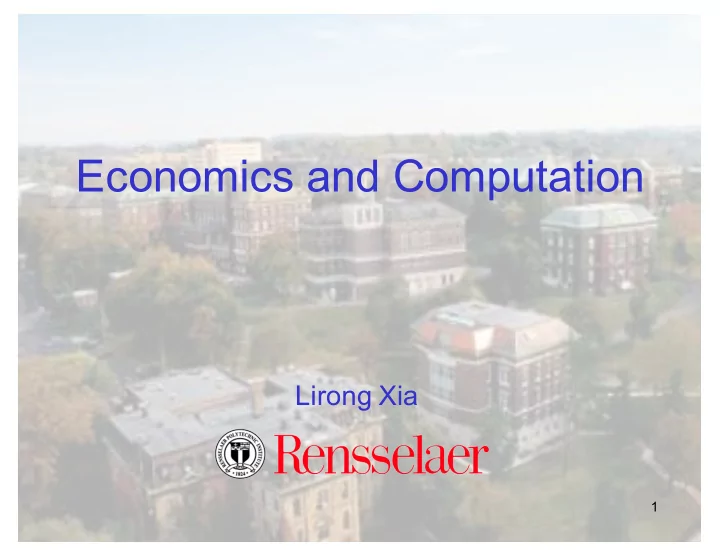

Economics and Computation Lirong Xia 1
This Course Ø Economics: decision making by multiple actors, each with individual preferences, capabilities, and information, and motivated to act in regard to these preferences. Ø Computer science: study of representation and processing of information for the purpose of specific calculation tasks. Ø Breadth over depth 2
Mostly a math course 3
Rules and Suggestions Ø No electronics in class • Unless explicitly told • You may printout slides, but please make sure you download the latest version. They are useful in exams anyway. Ø Take notes if possible Ø Questions are very welcome • If you don’t ask me, I may ask you (random quiz) Ø 10 min break for each (sub) topic • Q&A, feel free to speak Chinese 4
Tragedy of the commons: Braess’ Paradox Ø 2000 travelers from 1 to 4 𝑦 2 25min 100 1 4 𝑦 25min 100 3 Ø Centralized goal: minimize max delay • 1000 1 à 2 à 4; 1000 1 à 3 à 4; • minimaxdelay: 35min Ø No one wants to deviate 5
Tragedy of the commons: Braess’ Paradox Ø 2000 travelers from 1 to 4 𝑦 2 25min 100 0min 1 4 𝑦 25min 100 3 Ø Centralized goal: minimize max delay • 1000 1 à 2 à 4; 1000 1 à 3 à 4; • minimax delay: 35min 6
Tragedy of the commons: Braess’ Paradox Ø 2000 travelers from 1 to 4 𝑦 2 25min 100 0min 1 4 𝑦 25min 100 3 Ø No one wants 1 à 3 à 4 • 1 à 2 à 3 à 4 is always better Ø No one wants 1 à 2 à 4 • 1 à 2 à 3 à 4 is always better Ø Everyone goes 1 à 2 à 3 à 4, delay is 40min each Ø Paradox: worse than the system without 2 à 3 7 Ø More in the “game theory” class
Goal of the course Ø How to analyze the outcome? • Social choice, game theory Ø How to incentivize people? • Mechanism design Ø Economics + Computation • Incentives + computational thinking 8
Brief schedule Ø (Algorithmic) Game theory • 3 days Von Neumann Nash Selten Aumann Harsanyi Ø Auctions • 1 day Myerson Ø Mechanism design • 1 day Vickrey Ø (Computational) Social choice • 2 days Arrow Roth Shapley Ø Wisdom of the crowd • 1 day Ø Preference modeling • 1 day Kahneman McFadden Hansen Ø Bitcoin and blockchain • 1 day 9
Example: Auctions Ø 2 nd price auction • highest bid wins • charged the 2 nd highest price • more in the “auctions” and “mechanism design” class 10
Example: School choice > > > > Kyle > > > > Stan > > > > Eric 11
Example: Resource allocation > > > > > > > > > > > > > > > 12
Sequential allocation O = > > > > > Kyle > > > > > > Stan > > > > > > Eric Step 1 Step 2 Step 3 Step 4 Step 5 Step 6 13
Is it a good mechanism? Ø Sounds good • Efficient: if we have different preferences, then we will all (almost) get what we want • Fair: ( 1 st pick, last pick), ( 2 nd pick, 2 nd to last pick)… Ø How can we formalize these ideas? • more in “matching and resource alloation” 14
Example 3: Political elections > > Alice > > Bob > > Carol 15
The Borda voting rule LULL BORDA Ø Input: profile of rankings over alternatives Ø Output: a single winner • For each vote R , the alternative ranked in the i -th position gets m - i points • The alternative with most total points is the winner • Use some tie-breaking mechanism whenever there is a tie 16
Example of Borda > > Alice Borda > > Bob > > Carol Total scores : 0+0+2=2 : 1+1+1=3 : 2+2+0=4 17
Other voting rules? Ø Many other voting rules beyond Borda will be discussed in the next class Ø Which one is the best? • Hard to compare. • Criteria will be discussed in the social choice class 18
Example2: Crowdsourcing . . . . . . . . . . . . . . . . . . . . > > . . . . . . . . a b c c b > a b > a b > … Turker 1 Turker 2 Turker n 19
Optimal way to make a decision Ø How can we make an optimal decision by aggregating noisy answers from strategic agents? • more in “Wisdom of the crowd” 20
Grading, let’s vote Ø Final grades: • Option1: Participation 10%; 3 Exams 90% • Option2: Participation 40%; 3 Exams 60% • Option3: Participation 70%; 3 Exams 30% • https://opra.cs.rpi.edu/polls/204/ 21
Before tomorrow Ø Sign up on piazza Ø Sign up on OPRA and vote Ø Print the slides if you want Ø Remember to bring computer/smart phone for in-class voting (but don’t use it in class otherwise) 22
Recommend
More recommend